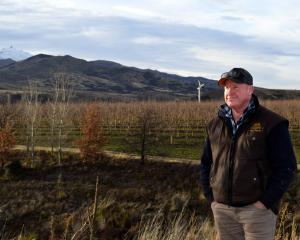
In a joint statement, Southland MP Joseph Mooney and Waitaki MP Jacqui Dean say it does not make sense that people are being allowed into New Zealand to work on movies, fishing boats or to play sport, but not to work in orchards or vineyards at what is a critical time.
Last month, an increase in the number of Covid-19 cases were attributed to Russian and Ukrainian fishers who were recruited to support New Zealand’s beleaguered fishing industry.
That led to a cluster of cases in Christchurch’s Sudima Hotel, managed isolation facility, with cases there still recorded yesterday.
"Every day that goes by is crucial — we want the Government to provide the meaningful support this [horticulture and viticulture] industry needs now," the statement said.
It said in previous years, the district has had a competent and able workforce from Ni-Vanuatu and that should be the case again this year.

To further safeguard New Zealand, Recognised Seasonal Employees (RSE) could be chosen from Covid-19-free countries only, but still placed in quarantine on arrival.
The statement noted that RSE workers were ready and willing to assist New Zealand with its looming harvest.
"The thought of crops going to waste because they cannot be picked is something we’re not prepared to sit back and let happen without a fuss — it would be so wrong."
Both MPs said while they were in opposition, they did not have the "power" to exert as much influence as they would like but they did have the opportunity in Parliament to question ministers in the debating chamber.
"The key for us is to make the most of every opportunity we get to put the case forward.
"But, to be perfectly frank, it shouldn’t require that — this is a situation where the Government should be able to see sense and make the right calls without us having to challenge them every step of the way."
Central Otago Mayor Tim Cadogan said he could not argue with most of the points the district’s MPs made.
"I will continue to support calls for workers from the Pacific to be allowed into the country, so long as that can be done safely.
"The clock is ticking very loudly though and right now my main focus is on supporting the ‘Spare Time, Spare Room’ call to action being driven by the Central Otago Recovery Response group which asks everyone in Central to play a part in resolving a problem that will affect all of us."
Queenstown Lakes District Mayor Jim Boult said he believed the issue should not become a "political football".
"The country’s recovery from Covid-19 and managing the risks that the continued global spread of this virus needs to be something we are all working on at a local, national and cross-party level."
He had a been a voice supporting migrant workers during the pandemic, he said.
"This is a time for creative thinking from our MPs and everyone involved, and I welcome the promised advocacy from our local MPs."
Comments
As the months have gone by it has become obvious that some industries are willing to let their products go to waste and blame the government rather than raise working conditions and reduce their profit margins as the free market ideology, that we have had rammed down our throats for the last 30 years, demands. Supply and demand , It only seems to apply for wages at the top end and when profits are being made, otherwise it seems to go out the window and losses are socialized.
We are told billions of dollars of fruit etc are at risk but the job offers so no sign of increased incentive to do this work . It seems despite months to adjust and prepare various industries have just been hoping covid would just go away, allowing access to their low wage workers again. Surely if there was this much product at risk we would see employers raising wage offers substantially as you would think the wasted products would cost far more that wage increases . It also goes to show just how much room the employers have to move , but aren't.
It seems they would just rather blame the govt than apply their own economic rules.















